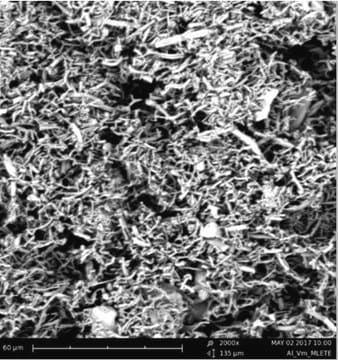Fontos dokumentumok
E64-RO
Roche
E-64
N-[N-(L-3-Trans-carboxirane-2-carbonyl)-L-leucyl]-agmatine
Szinonimák:
E-64, n-[n-( l-transepoxysuccinic acid)-l-leucyl]-agmatine, n-[n-(l-3-trans-carboxirane-2-carbonyl)-l-leucyl]-4-aminobutylguanidine, n-[n-(l-3-trans-carboxirane-2-carbonyl)-l-leucyl]-agmatine.
note: another name for l-3-trans-carboxyoxiran-2-carboxylic acid acid is l-transepoxysuccinic acid. agmatine is 4-aminobutylguanidine., trans-Epoxysuccinyl-L-leucylamido(4-guanidino)butane, L-trans-3-Carboxyoxiran-2-carbonyl-L-leucylagmatine, N-(trans-Epoxysuccinyl)-L-leucine 4-guanidinobutylamide
About This Item
Javasolt termékek
Minőségi szint
Teszt
>95% (HPLC)
form
powder
molekulatömeg
Mr 357.4
kiszerelés
pkg of 10 mg (10874523001)
pkg of 25 mg (11585681001)
gyártó/kereskedő neve
Roche
pH-tartomány
2-10
oldhatóság
ethanol: water (1:1): soluble 20 mg/mL
tárolási hőmérséklet
2-8°C
SMILES string
CC(C)C[C@H](NC(=O)[C@@H]1O[C@H]1C(O)=O)C(=O)NCCCCNC(N)=N
InChI
1S/C15H27N5O5/c1-8(2)7-9(20-13(22)10-11(25-10)14(23)24)12(21)18-5-3-4-6-19-15(16)17/h8-11H,3-7H2,1-2H3,(H,18,21)(H,20,22)(H,23,24)(H4,16,17,19)/t9-,10+,11+/m0/s1
Nemzetközi kémiai azonosító kulcs
LTLYEAJONXGNFG-HBNTYKKESA-N
Looking for similar products? Látogasson el ide Útmutató a termékösszehasonlításhoz
Related Categories
Egyediség
Alkalmazás
It has been used in the affinity chromatography for the purification of hemoglobin receptors.
The inhibition of thiol proteases by E-64 appears to be of a non-competitive nature between the SH components. The inhibition is also irreversible, and is altered after gel filtration (Sephadex column) or dialysis after incubation of papain with E-64. The enzyme and inhibitor combine in an equimolar ratio.
Biokémiai/fiziológiai hatások
Elkészítési megjegyzés
Working solution: Soluble to 20 mg/ml (stock solution) in a 1:1 (v/v) mixture of ethanol and water (vortexing or slight warming in water bath (40 °C) may facilitate dissolution). Also soluble in a neutral water/methanol solution, in water, methanol, acetic acid, pyridine and DMSO. Sparingly soluble in ethanol and propanol. Insoluble in acetone, chloroform, ethyl ether and benzene.
Storage conditions (working solution): -15 to -25 °C
Solutions are stable for one month when stored in aliquots at -15 to -25 °C.
Feloldás
Egyéb megjegyzések
Figyelmeztetés
Warning
Figyelmeztető mondatok
Óvintézkedésre vonatkozó mondatok
Veszélyességi osztályok
STOT SE 2
Tárolási osztály kódja
11 - Combustible Solids
WGK
WGK 2
Lobbanási pont (F)
does not flash
Lobbanási pont (C)
does not flash
Analitikai tanúsítványok (COA)
Analitikai tanúsítványok (COA) keresése a termék sarzs-/tételszámának megadásával. A sarzs- és tételszámok a termék címkéjén találhatók, a „Lot” vagy „Batch” szavak után.
Már rendelkezik ezzel a termékkel?
Az Ön által nemrégiben megvásárolt termékekre vonatkozó dokumentumokat a Dokumentumtárban találja.
Tudóscsoportunk valamennyi kutatási területen rendelkezik tapasztalattal, beleértve az élettudományt, az anyagtudományt, a kémiai szintézist, a kromatográfiát, az analitikát és még sok más területet.
Lépjen kapcsolatba a szaktanácsadással








